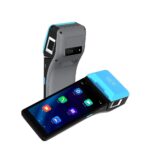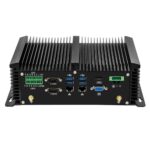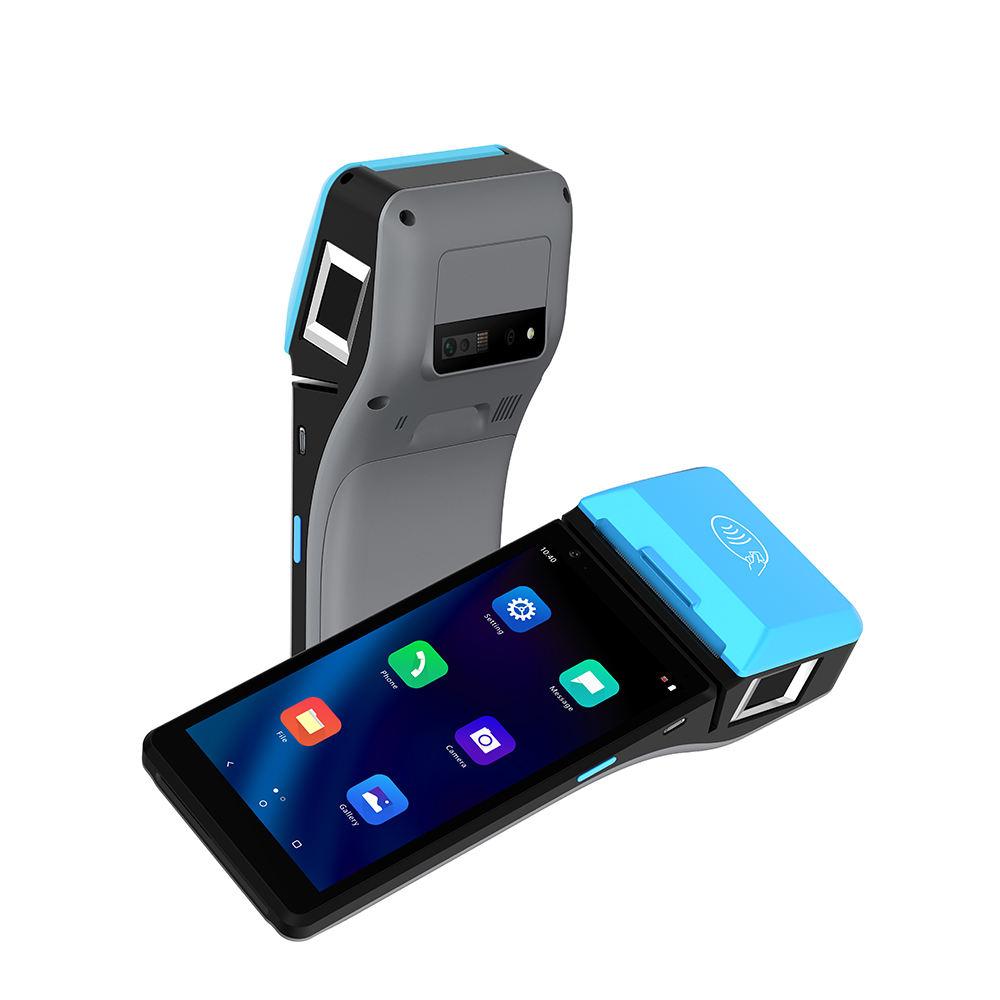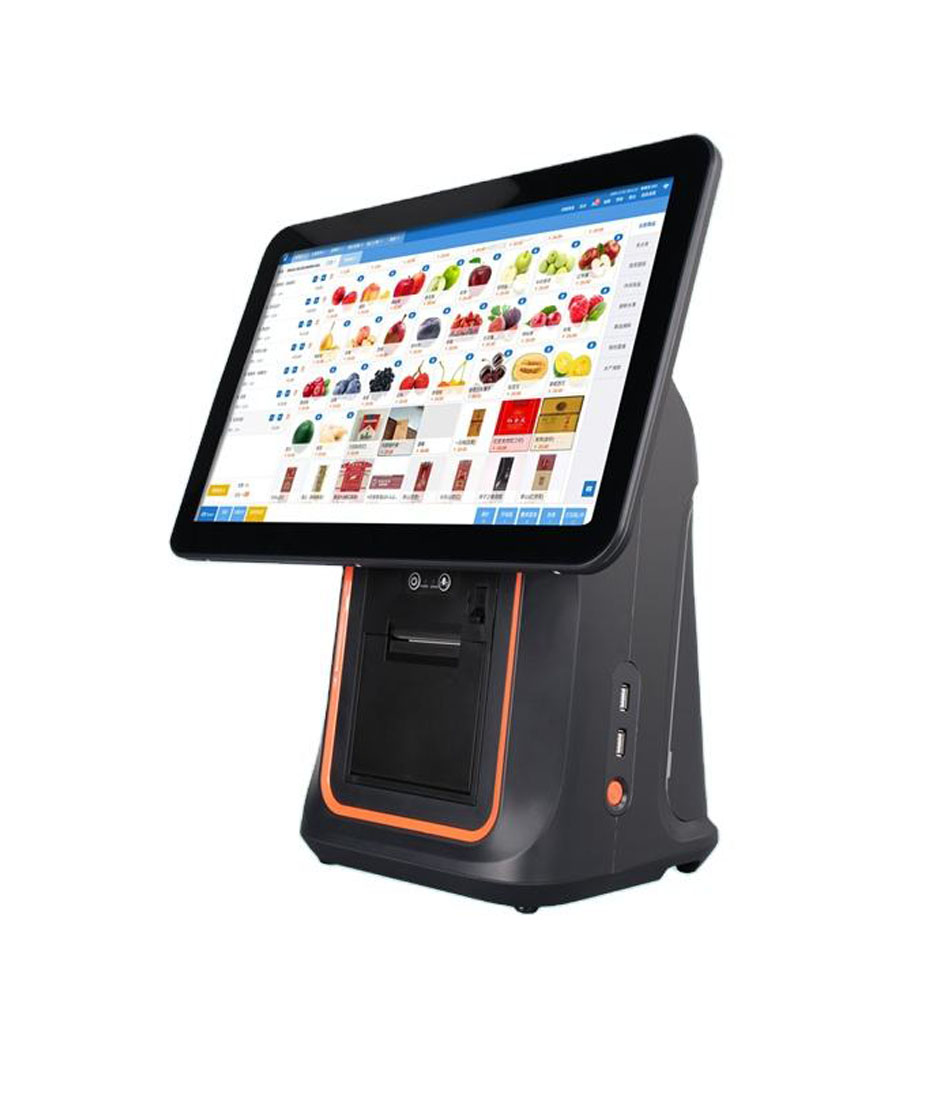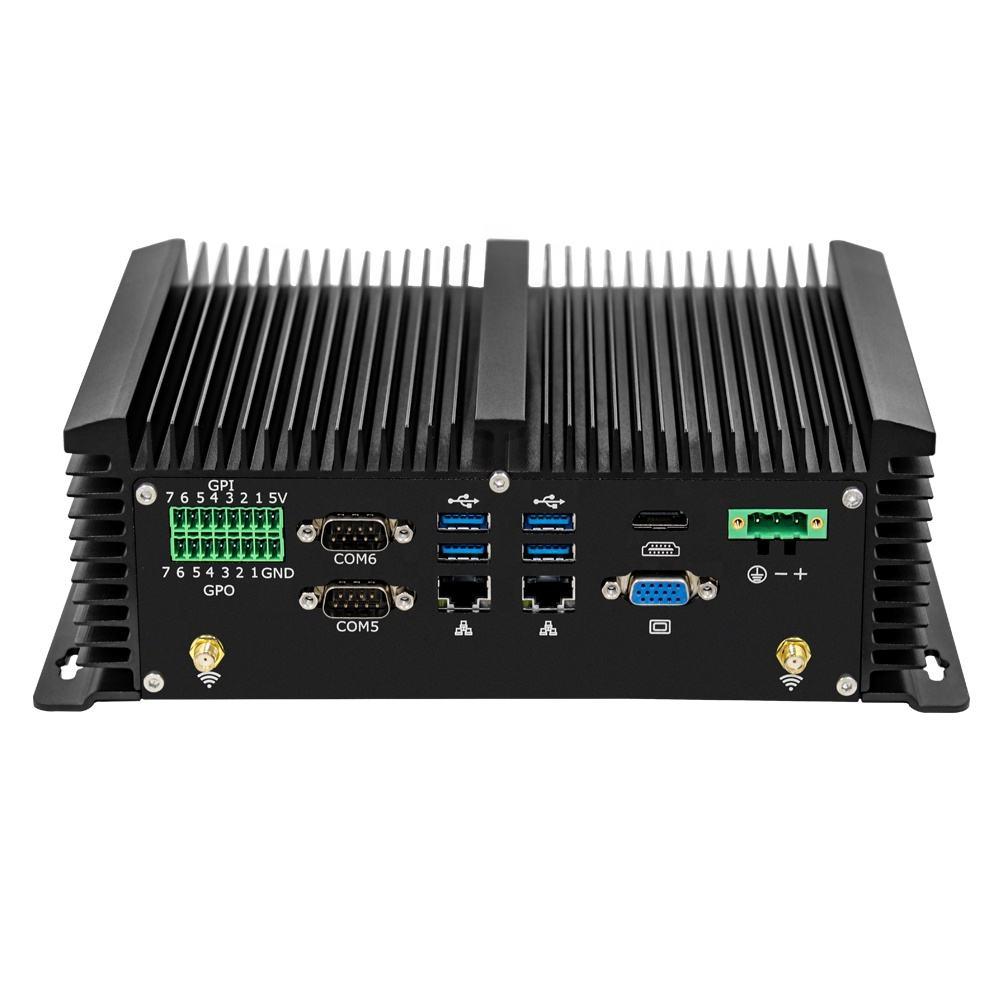
When you pick a Mini PC box for factory automation, you should look for reliability, compatibility, and durability. Many people say they have problems like loud fans, power supply problems, and random shutdowns. You can stop these problems by choosing fanless designs and strong hardware. DcaPOS makes Mini PC boxes for hard industrial places, so you have less downtime and better performance. This guide helps you make good choices and not make expensive mistakes.
Common reliability problems in industrial mini PCs include:
- Fans needing to be replaced often
- Power supplies outside the device breaking
- Devices not turning on or shutting down without warning
Key Takeaways
- Pick fanless, rugged Mini PC boxes to stop noise and breakdowns. This helps avoid downtime in tough factory places.
- Find Mini PC boxes with strong processing power and many ports. Good connectivity helps control machines and collect data fast.
- Think about the future and choose models that can upgrade and expand. This can help you save money later.
- Choose vendors who give good support and let you customize. Make sure they are reliable to keep your factory working well.
- Always test the Mini PC box in real factory settings before you buy. This makes sure it fits your needs and works right.
Role in Automation
Why Use Mini PC Boxes
A Mini PC box can help make your factory smarter. It is small and fits in tight spaces, like behind screens or inside machines. You can use it to control machines, watch what is happening, and collect data. In a factory, you may need to check machines, gather sensor data, or control robots. A Mini PC box lets you do these jobs without taking up much space.
Factories use Mini PC boxes as IoT gateways. They connect machines and sensors and send data to the cloud or a main server. You can also use them for machine vision systems. For example, a Mini PC box can look at camera images to check product quality or help robots move. DcaPOS makes strong, fanless Mini PC boxes that work well in dusty or loud places. Their products have many ports, like USB, LAN, and serial ports, so you can connect them to almost any device in your factory.
Tip: Pick a fanless Mini PC box if you want less noise and less work to keep it running in tough places.
Key Benefits
There are many good things about using a Mini PC box in your factory:
- Small Size: You can put them in places where big computers cannot go.
- Rugged Design: They keep working in hot, dusty, or shaky spots. Fanless models have fewer moving parts, so they break less.
- Energy Efficiency: They use less power, which saves money and keeps your factory cooler.
- Easy Integration: You can connect them to many devices and systems. This makes it easy to add new machines or sensors.
- High Uptime: They help your machines run longer by letting you watch them in real time and fix problems before they get worse.
DcaPOS Mini PC boxes give you all these good things. You can count on them to work all day and night, even in hard places. Their flexible designs help you build a smart factory that can grow when you need it to.
Mini PC box Features
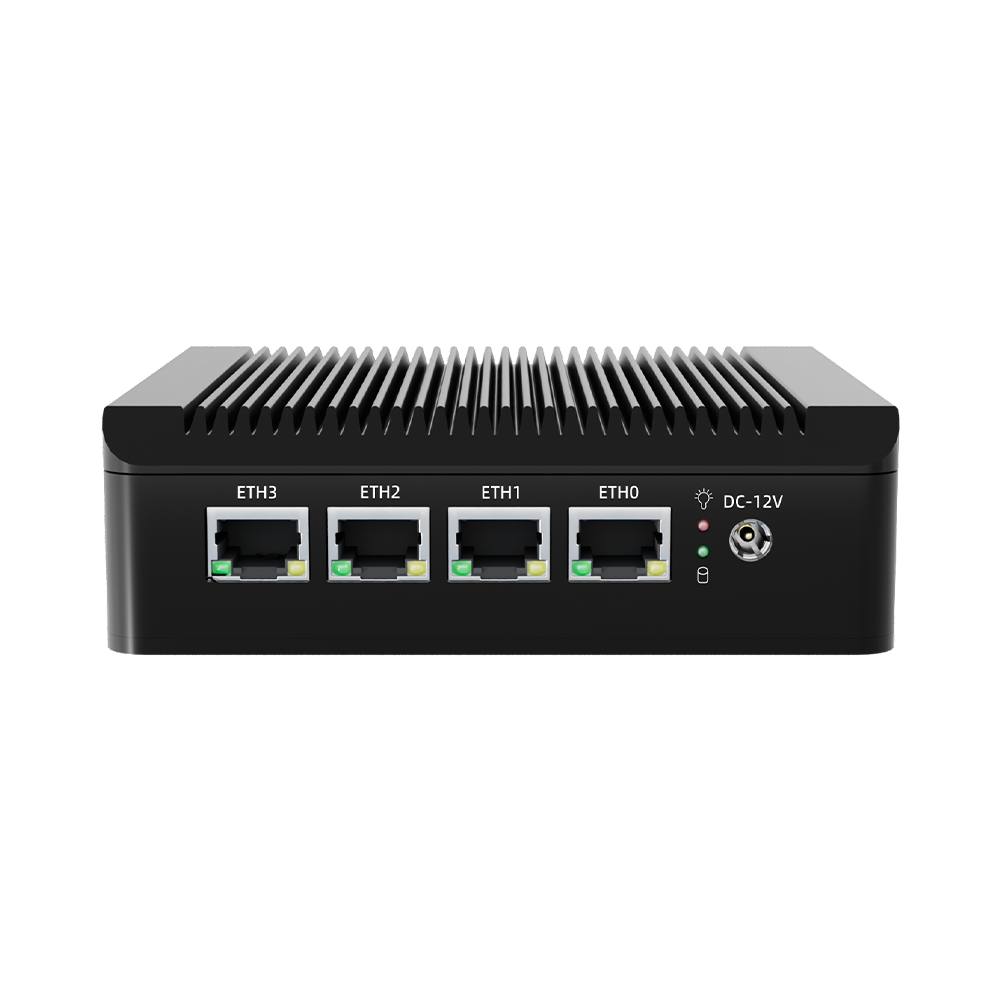
Processing Power
You need enough processing power for your factory jobs. Mini PC boxes use different Intel® processors, like Celeron®, Atom®, and Core™ series. These processors give you the speed and dependability you need. They help with automation, machine vision, and collecting data. Some models have quad-core or hexa-core CPUs. This means you can run more than one program at once.
| Model | Processor Type | CPU Details | OS Support | Operating Temperature Range | Notes |
|---|---|---|---|---|---|
| IPC2110A | Intel® Celeron® J4125 | 2.0GHz Quad-Core CPU | Windows 10/11, Linux | 5°~40°C | Fanless, VESA mount included |
| IPC2210A | Intel® Elkhart Lake Atom® x6425E | 2.0GHz Quad-Core CPU | Windows 10/11, Linux | -40°~70°C | Extended temp, wall mount included |
| IPC2770A | Intel® 12th Gen Alder Lake Core™ i3 | Hexa-Core i3-1215UE | Windows 10/11, Linux | -20°~50°C | Quad-display UHD 4K output |
| IPC2410A | Intel® Quad-Core Atom® x6425RE | 1.9GHz CPU | Windows 10/11, Linux | -40°~60°C | Optional 4G module |
| IPC2610A | Intel® Quad-Core Atom® x7-E3950 | 1.6GHz CPU | Windows 10 | -40°~70°C | UL-listed, fanless, DIN-rail mount |
| IPC2411A | Intel® Quad-Core Atom® x6425RE | 1.9GHz CPU | Windows 10/11, Linux | -40°~60°C | POE+ ports, wall mount included |
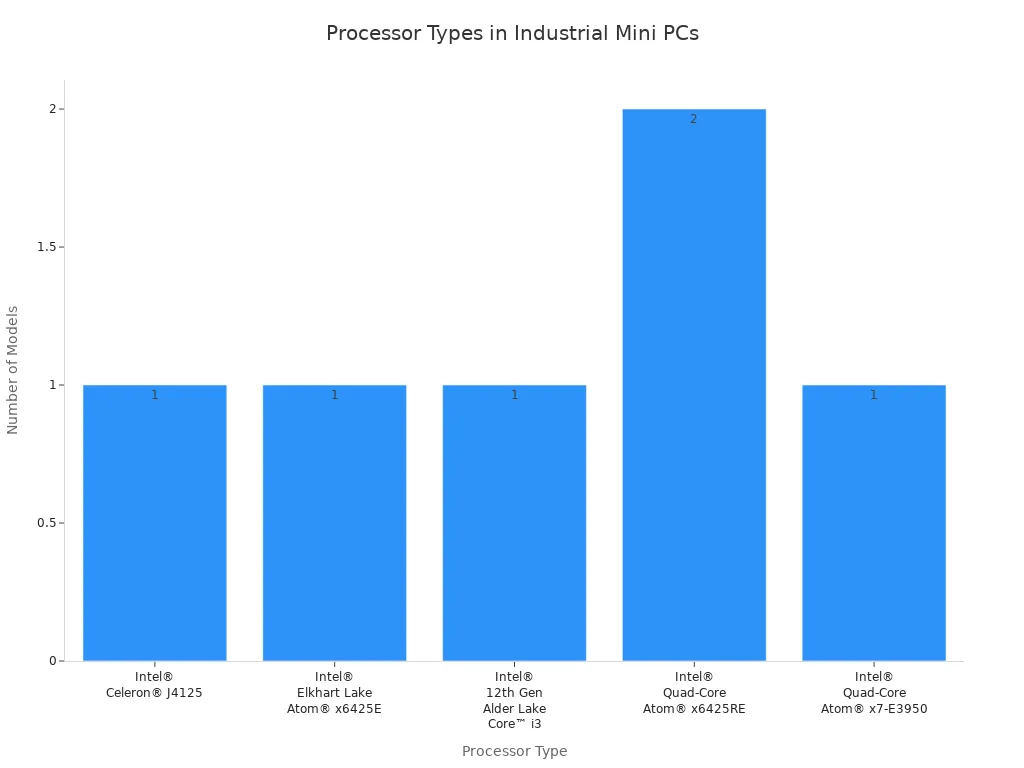
DcaPOS has many processor choices. You can pick the Mini PC box that fits your work.
Durability
Factories are rough places. You want a Mini PC box that keeps working with dust, heat, and shaking. DcaPOS uses strong materials, like tough aluminum alloy, to protect the inside. Fanless designs keep out dust and help stop breakdowns. Many models are waterproof and have seals to block water and chemicals.
- Strong parts resist heat and last longer.
- Fanless heatsink keeps dust out and cools the system.
- Waterproof and dustproof models (IP65 to IP69K) block water and dirt.
- Solid build and special inside parts help with shock and shaking.
- All-aluminum and ridges help get rid of heat.
DcaPOS checks every Mini PC box for shock, shaking, and hot or cold weather. This means your device works all day, even in tough places.
| Standard | Description & Application | Shock & Vibration Criteria / Features |
|---|---|---|
| MIL-STD-810G | U.S. military standard for environmental testing | Shock testing with half-sine waveforms and random vibration testing across multiple axes. Validates ruggedness. |
| EN 50155 | European standard for railway electronics | Vibration: 5-150 Hz, 10 min/axis; Shock: half sine wave, 50 m/s² for 30 ms. Ensures reliability in harsh environments. |
| IEC 60068 | International standard for environmental testing | Sine wave vibration and mechanical shock testing. Provides general durability criteria. |
| EN 61373 | Railway applications standard | Tests vibrations and shocks specific to railway equipment durability. |
Connectivity
You need to connect your Mini PC box to many things. DcaPOS gives you lots of I/O options. You can link to sensors, machines, and networks. You get many USB ports, LAN ports, and serial ports like RS-232/422/485. Some models have Wi-Fi, Bluetooth, and 4G LTE for wireless use.
- Many serial ports (COM) for old and factory devices
- USB 2.0 and USB 3.0 ports for extra devices and moving data
- LAN ports (1 GbE and 2.5 GbE) for network links
- Digital I/O (GPIO) for easy signal control
- Optional wireless (Wi-Fi, Bluetooth, 4G/LTE) for remote use
- HDMI and VGA for screens
| I/O Interface Type | Description | Factory Integration Support |
|---|---|---|
| COM Ports | 6 x COM ports | Connect serial devices for signal control and communication |
| USB Ports | 4 x USB Type A | Connect peripherals and data collection devices |
| LAN Ports | 2 x LAN ports | Enable network communication between automation systems |
| GPIO | Optional GPIO | General purpose input/output for flexible device control |
| Expansion Slots | PCI, PCIe x1/x16 | Add specialized cards for extended connectivity |
| Video Outputs | HDMI, VGA | Support display and monitoring |
These features help you watch, control, and share data with your factory gear.
Expandability
Your factory might need more later. You want a Mini PC box that can change. Some models let you add more storage, RAM, or cards. This helps you keep up with new programs or more devices.
| Aspect | Mini PC Characteristics | Impact on Long-term Usability in Factories |
|---|---|---|
| Processing Power | Limited by small form factor and thermal constraints | May not keep up with increasing performance demands over time |
| Storage Capacity | Typically 1-2 internal bays, SSDs with less capacity | Restricts ability to expand storage internally as needs grow |
| Upgradeability | Limited RAM/storage upgrades; many components integrated | Often requires full replacement rather than incremental upgrades |
| Adaptability | Less flexible than desktops for customization | Limits future-proofing and scalability in evolving factory setups |
DcaPOS has models with slots and flexible ways to mount. You can use DIN rail or VESA mounts to fit your space.
Tip: Think about what you might need later when you choose your Mini PC box. Expansion helps you save money by not needing a new one soon.
Power Efficiency
Mini PC boxes use much less power than big desktop computers. Most models use between 20 and 50 watts. This saves you money on power and cooling.
| Device Type | Typical Power Consumption (Watts) |
|---|---|
| Mini PC | 20 – 50 |
| Desktop PC | 60 – 200 |
Energy-saving processors and fanless designs help keep your factory cool. Using less power means less heat, so you spend less on air conditioning. You also get fewer problems and less downtime.
Mini PCs with Intel N-series or Atom chips can run all day and night. They do not use much energy. This is great for factories that work all the time.
Protocol Support
You need your Mini PC box to talk to many kinds of machines. DcaPOS supports the most used industrial protocols. This lets you connect to both new and old machines.
- Ethernet-based protocols like PROFINET and EtherNet/IP are used for new setups.
- Old serial protocols like Modbus RTU and PROFIBUS are still used for older systems.
- Serial communication (RS-232, RS-485) lets you connect to many devices.
- Lower-level protocols like I2C and SPI help with sensors and small devices.
Protocol support lets your Mini PC box work with many brands and types of equipment. You can collect data, control machines, and send info to the cloud. This makes your factory ready for changes and new tech.
DcaPOS checks every Mini PC box for quality and offers custom services. You can get special hardware, firmware, or branding to fit your needs. This makes sure your automation system works well and grows with your business.
Buying Guide
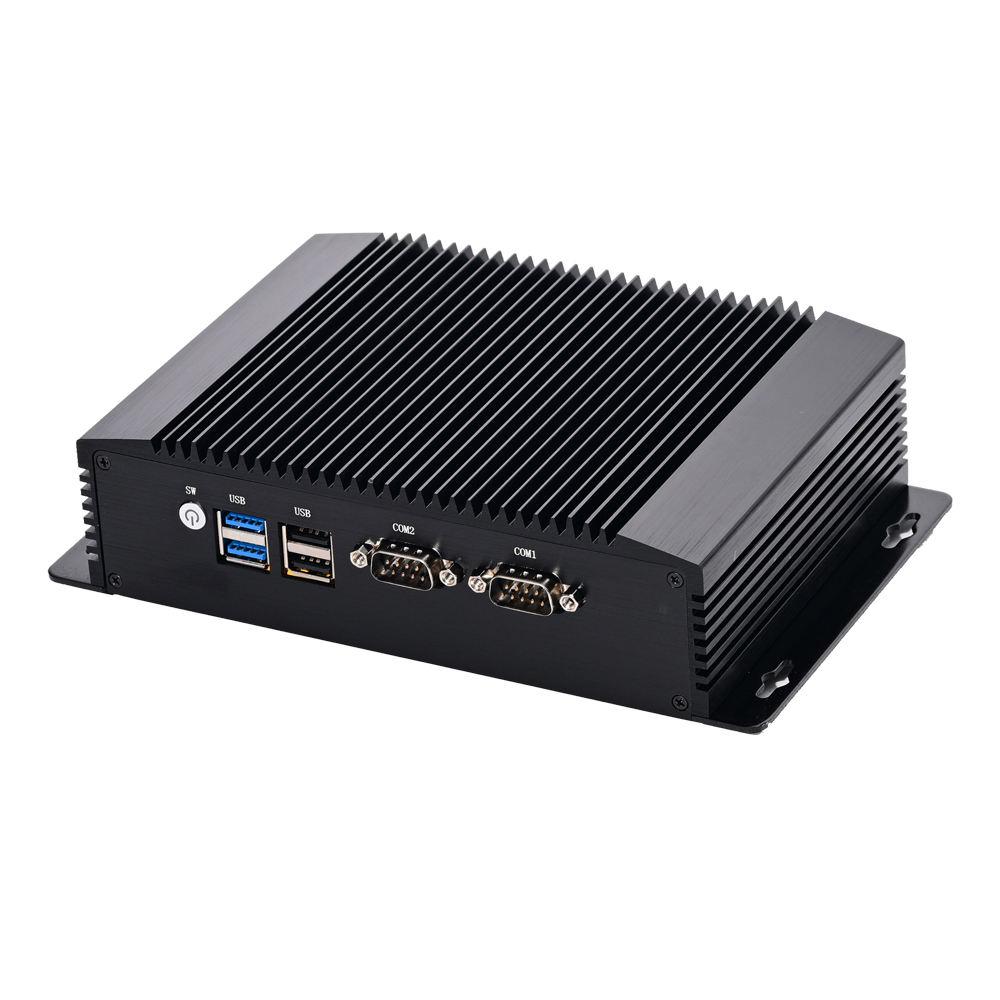
Assess Needs
First, figure out what your factory needs. Think about the jobs for the computer. Some factories need simple control. Others need to handle lots of data or smart cameras. Look at your machines and sensors. Make a list of the ports you need, like USB, serial, Ethernet, or HDMI. Check if you need extra slots for upgrades later.
Also, think about where you will put the computer. Factories can be hot, dusty, or shaky. Pick a model that works in tough places. Fanless and rugged designs are best for harsh spots. Knowing these things helps you choose a Mini PC box that lasts and works well.
Tip: Write down your needs before shopping. This helps you find the right fit.
Steps to assess your needs:
- Check what devices you want to connect.
- Decide how much processing power you need.
- Think about heat, dust, and vibration.
- Plan for upgrades or changes later.
Compare Options
When you look at different models, check more than price. Focus on what each computer can do. See how well it fits your needs. Use a table to compare them easily.
| Factor | Mini PC Characteristics | Box PC Characteristics |
|---|---|---|
| Processor | Uses consumer-grade CPUs (Intel Core, AMD Ryzen), often with higher clock speeds for general tasks | Industrial-grade CPUs (Intel Xeon, Pentium, Celeron) optimized for reliability over cutting-edge performance |
| Portability | Compact, lightweight, consumer-friendly design | Rugged, heavier, designed for fixed mounting (DIN-rail, VESA) |
| Cooling | Usually fan-cooled, requiring active cooling systems | Often fanless or with rugged cooling to reduce failure points |
| Ruggedness & Environment | Less rugged, suited for office/home environments | Designed for harsh industrial environments, dust, vibration, temperature extremes |
| Connectivity | Consumer ports (USB, HDMI, Wi-Fi, Bluetooth), suitable for peripherals and multiple monitors | Industrial ports (Serial, Ethernet, PoE, legacy ports) for PLCs, sensors, automation systems |
| Software & Integration | Standard consumer OS (Windows, Linux, Android), consumer drivers, basic remote management | Industrial OS variants with real-time features, specialized drivers, advanced remote management |
| Power Consumption | Energy efficient, low power use (some models as low as 8 watts) | Higher power use but optimized for 24/7 operation and longevity |
| Cost | Lower initial cost ($159-$1199), cost-effective for less critical applications | Higher initial cost justified by reliability and total cost of ownership in critical industrial settings |
| Reliability | Suitable where failure is acceptable and replacement is easy | Critical reliability needed; failure can cause costly downtime or safety risks |
| Maintenance & Support | Easier to replace or upgrade, consumer-level support | Requires specialized support, longer lifecycle, and maintenance planning |
| Scalability | Easier upgrades and replacements in home/office settings | Longer lifecycle, stable platform for industrial changes |
You should also think about processor type and speed. Size and weight matter too. Check power use and how easy it is to set up. Ruggedness is important for tough places. Look at ports and connections. Think about cost and value. Reliability matters for long hours. Make sure there is room to grow later.
Evaluate Vendors
Picking the right vendor is very important. Look for companies with a good name and strong support. Make sure they offer the software and operating system you need. Check if they can help with custom features or special setups.
Note: DcaPOS offers OEM/ODM customization and long-term support. This helps you get a system that matches your needs.
Here are some things to check:
- Does the vendor support your software and operating system?
- Do they use strong, industrial parts?
- Are their products tested for dust, shock, and heat?
- Can they customize hardware or software for you?
- Do they have good reviews and a strong reputation?
- What kind of warranty and support do they offer?
- Is customer service easy to reach?
- Do they help with upgrades and repairs?
- Are their products energy efficient?
- Do they offer security features to protect your data?
| Criteria | Explanation |
|---|---|
| Software & OS Compatibility | Support for industrial OS like Windows Embedded, Linux, RTOS, and software compatibility. |
| Reliability & Durability | Industrial-grade components, SSDs for shock resistance, fanless cooling, and extended temp range. |
| Regulatory Compliance | Compliance with EMC, UL, CE, ATEX, IECEx certifications as applicable. |
| Total Cost of Ownership | Consider acquisition, installation, maintenance, support costs, and downtime impact. |
| Performance Requirements | Processor, RAM, and storage must meet application needs. |
| Environmental Resistance | Resistance to dust, vibration, temperature extremes. |
| Connectivity Options | Adequate ports and network interfaces for integration. |
| Size & Mounting Flexibility | Compact size and flexible mounting options. |
| Power Requirements | Compatibility with available power sources and efficiency. |
| Vendor Reputation | Choose reputable manufacturers known for quality and reliability. |
| After-Sales Support & Warranty | Good customer support and warranty coverage. |
| Customization Options | Ability to tailor hardware/software to specific needs. |
| Ease of Maintenance | Design allowing easy upgrades and repairs. |
| Security Features | Built-in protections for industrial data and operations. |
| User-Friendliness | Intuitive interfaces suitable for industrial staff. |
| Energy Efficiency | Minimize operational costs and support green initiatives. |
| Future-Proofing | Support for evolving technologies and scalability. |
Budget
Set your budget before you buy. Prices for industrial computers can be very different. You do not always need the most expensive model. Match your budget to your needs. Think about the cost to buy, install, and keep the computer running. Also, plan for upgrades and repairs later.
| Budget Category | Typical Price Range (USD) | Performance & Use Case Summary | Brand Examples & Price Notes |
|---|---|---|---|
| Low-Budget | $500 – $2000 | Basic industrial control, simple data acquisition, lower performance and scalability | Advantech ($500-$1000), Siemens ($1000-$2000), Maple Systems ($600+), Industrial PC, Inc ($800+) |
| Medium-Budget | $1000 – $5000 | Mid to high-end processors, better memory/storage, environmental adaptability, suitable for medium complexity industrial applications | Siemens ($2000-$5000), Advantech ($1000-$3000), OnLogic ($2000-$5000), Maple Systems ($1000-$3000) |
| High-Budget | Above $3000 – $5000+ | Specialized, high-performance, high-reliability, suitable for harsh environments and critical applications | Siemens (>$5000), Advantech (>$3000), OnLogic (>$5000), Maple Systems (>$3000) |
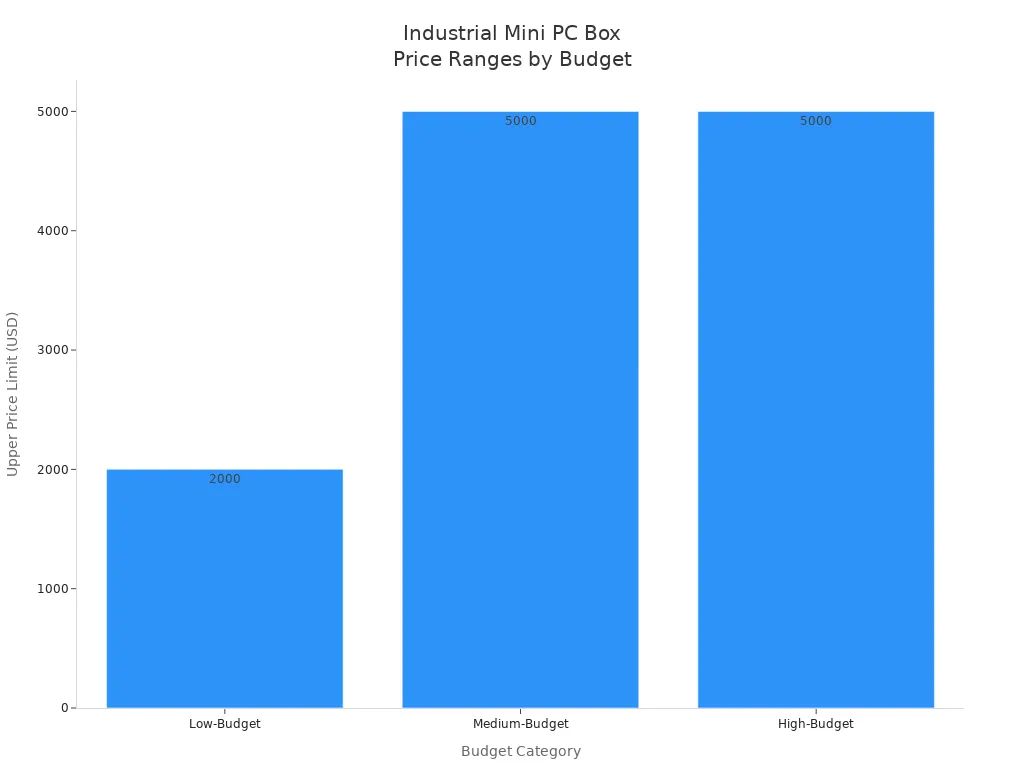
Tip: Do not spend more than you need. Pick a model that fits your job and saves money over time.
Test Before Buying
Test the Mini PC box in your factory before buying. This helps you find problems early. Check that all ports work and the computer runs your software. Try it in real conditions—hot, cold, dusty, or shaky places.
Follow these steps for testing:
- Turn on the computer and check for errors.
- Make sure all ports and connections work.
- Test communication with other machines.
- Run your software and look for problems.
- Simulate normal and fault conditions to see how it reacts.
- Use logic diagrams and requirement documents to guide your tests.
- Ask experienced engineers to help and review results.
Note: Good testing helps you avoid mistakes and keeps your factory running smoothly.
DcaPOS gives strong support and can help with testing, setup, and custom features. Their long-term support and customization make them a smart choice for many factories.
Mistakes to Avoid
Ignoring Environment
You might think any computer will work in your factory, but the environment can cause big problems. Factories often have dust, heat, and vibration. These things can damage your computer and make it stop working. Here are some common environmental risks:
- High or low temperatures can slow down your computer and make parts wear out faster.
- Humidity can cause short circuits and rust inside the computer.
- Dust can block cooling and cause the computer to overheat.
- Chemicals in the air can eat away at metal parts.
- Vibration and shock from machines can loosen parts or break hard drives.
Tip: Choose a computer built for tough places. Clean and check it often to keep it running well.
Overlooking Expansion
You may only need a few ports or features now, but your factory could grow. If you pick a computer that cannot expand, you might need to buy a new one soon. Look for models with extra slots for storage, memory, or cards. This helps you add new machines or sensors later. Planning for growth saves money and time.
Focusing Only on Price
Saving money feels good, but picking the cheapest option can cost more in the long run. Low-cost computers may not last in harsh factory settings. They might break down or need repairs often. Think about how much downtime or lost data could cost you. A strong, reliable computer gives you better value over time.
Neglecting Support
Good support from your vendor makes a big difference. Reliable suppliers help you keep your factory running smoothly. They answer questions, fix problems, and deliver on time. Strong customer service and open communication help you avoid delays. Studies show that working closely with your supplier can boost innovation and cut costs. Regular feedback and formal reviews also help you get better products and prices.
Note: Choose a vendor with a good reputation and strong support. This helps your factory stay productive and ready for the future.
Buyer Checklist
Must-Haves
You want your factory computer to work well for a long time. Check these important features before you buy:
- Industrial-grade parts can handle dust, heat, and shaking.
- Fanless or ventless design means it is quiet and needs less fixing.
- Make sure it has enough processing power, like Intel Core i3, i5, i7, or Celeron CPUs.
- Memory should be from 8GB up to 64GB RAM for smooth work.
- You need many USB, serial, and Ethernet ports for machines and sensors.
- Real-time data processing close to the machines helps stop delays.
- Pick a model you can upgrade or add more ports to later.
- A strong power supply and good cooling help it run all day and night.
- Easy cable management keeps air moving and the system steady.
Tip: Always pick computer specs that match your factory’s work and space.
Vendor Review
Look at the vendor closely before you choose. A good vendor helps you avoid trouble and keeps your factory working. Use this table to help you check:
| Criteria | What to Look For |
|---|---|
| Product Testing | Devices tested for dust, shock, and heat |
| Customization Options | Ability to tailor hardware and software |
| Support and Warranty | Fast help and clear warranty terms |
| Reputation | Positive reviews and proven reliability |
| Long-Term Availability | Commitment to future support and upgrades |
Note: Vendors like DcaPOS give strong help and custom choices for factories.
Final Check
Before you buy, do a last check to make sure everything is right:
- Make sure all parts work together, like CPU, RAM, storage, and power.
- Test cooling and airflow so it does not get too hot.
- Check the power supply matches what you need.
- Make sure all ports and connections fit your devices.
- Plan for upgrades and changes in the future.
- Look at cable management for safety and to keep things steady.
✅ Doing a careful last check helps you avoid mistakes and keeps your factory running well.
You want your factory to work well and stay safe. Pick a computer that is reliable and tough. Make sure it has the features you need. Use a checklist to help you choose the best one. Always try it out before you buy. DcaPOS offers strong computers you can change for your factory. You can count on their help and good quality for your automation jobs.
FAQ
What is a fanless mini PC box and why should you choose one?
A fanless mini PC box cools itself without a fan. It uses a special design to stay cool. You should pick one if you want less noise. It also has fewer moving parts, so it breaks less. This means you do not have to fix it as much. It works well in dusty or loud factory areas.
How do you know if a mini PC box is rugged enough for your factory?
Check the temperature range and shock ratings of the product. Look at the vibration and IP rating too. Find words like “industrial-grade” or “rugged” in the details. Ask the vendor for test results or certifications. This helps you know if it is strong enough.
Can you upgrade storage or memory in a mini PC box?
Many mini PC boxes let you add more storage or memory. Check the product details or ask the vendor to be sure. Some models have panels that are easy to open. This makes upgrades simple.
What operating systems can you use on industrial mini PC boxes?
Most industrial mini PC boxes work with Windows and Linux. Some also support real-time operating systems. Check the product specs to make sure your software will run.
Why is protocol support important in factory automation?
Protocol support lets your mini PC box talk to many machines. It helps you connect both old and new equipment. You can collect data and control devices more easily.

